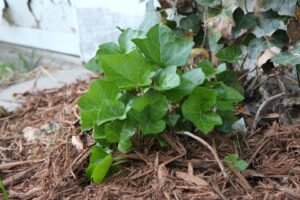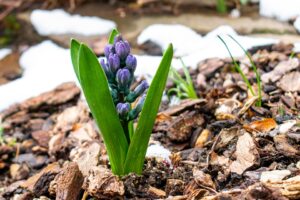The Benefits of Mulching Your Vegetable Garden in the Fall

Mulches are natural organics that can benefit our gardens and landscapes in so many ways however although mulches are popular their use is limited by many homeowners simply because of not knowing how important mulches are to plant life, soil, and soil microbes. I have used mulches over the years both on outdoor garden projects as well as interior plantscape and have seen how these natural organics do not only transform (aesthetics) those garden projects but the nutrients that were added as mulches break down or decompose over time.
Mulches should be applied through the spring, summer, fall, and winter months because of the vital role they play, whether you’re growing vegetables, fruits, herbs, ornamentals, etc… these natural organic does have their place in the landscape and gardens. Below we will be discussing applying mulch to fall vegetable gardens in South Florida.
Affiliate Disclaimer
As the owner of this website, I’ve tracked down special deals for some of the products mentioned here. When you use the links on this page to make a purchase I may get a small commission and you will get a great bargain. It’s a WIN-WIN for both of us.
10 Advantages of Applying Mulch
1. For Aesthetics: The number one reason why most people apply mulches is for beautification and while this reason is great for that detailed finish there are so many other reasons.
2. Mulches Help to Conserve Moisture: We should mulch especially during the summers months, the reason for this is mulching helps to retain water for garden plants and reduces rain runoff when it rains or during the rainy months which can decrease the amount of water which is applied by manual or automatic irrigation that can save both time and a few extra bucks on your water bill.
3. Mulches Provide Nutrients: In order for garden plants to thrive and grow healthy they need our help, as mulches break down or decompose will provide the nutrients that plant needs. What I love about these natural organics is there are no side effects, mulches also help to prevent vitamin loss and will give a saving from purchasing fertilizers.
4. Mulches are Eco-Friendly: Mulches are eco-friendly meaning once applied will invite beneficial insects into your garden area which will in turn benefit garden plants.
5. Mulches increase Biological Activity in the Soil: Soil microbes and earthworms are beneficial to plant life, garden soil contains billions of these microbes that are busy or hard at work breaking down natural organics (mulches) into a form that’s taken up by plant roots.
6. Improves Soil Structure and Drainage: Garden soil needs a little help and in some cases lots of help, some garden soils are of poor quality and must be conditioned for plant survival the incorporation of mulches will help to build or improve soil structure along with helping to provide proper soil drainage.
7. A Natural Organic: This natural organic matter will not only improve plant health but will help garden plants to be resistant to disease and pests.
8. Mulches are a Great Insulator: Mulches help to regulate the soil temperature, in the summer mulches helps to consistently keep plants’ roots cool and during the winter time mulch helps to keep the roots of plants warm.
9. Prevents Soil Erosion: Mulches help to prevent soil erosion and soil compaction from heavy foot traffic on play areas and garden path walkways.
10. Acts as a Weed Barrier: A 4-6 inch layer of mulch will prevent weeds from germinating by blocking the sun’s light because weeds compete with garden plants for sunlight, water, and nutrients.
How to Apply Mulch

When Applying mulch apply a 4-6 inch layer around garden plants but before placing mulch ensure that all of the weeds are removed first, what is important to note however is when mulching keep mulches 1-inches away from the plant stem. Mulches that make constant contact with plant stems will encourage rot. When mulching around the trunks of trees mulches should be kept 8-10 inches away from the trunk or there should be an 8-10 inch gap or ring from the trunk.
Bonus just for You
1. The ideal time to apply mulch is during the spring months before weeds start to germinate.
2. Use leaves that have aged for about nine months this allows the growth-inhibiting phenols to be leached out.
3. Grass clippings that are used as mulch should be allowed to dry in the sun for a day or two.
4. Avoid the use of grass clippings that have been treated for toxic pest control or herbicides.
5. Wheat straw and leaves can rob the soil of nitrogen as they decompose therefore it’s best to apply a nitrogen-rich fertilizer under mulch.
Types of Mulches
Organic Mulch Varieties for Garden Use.
- Wood Chips
- Barks
- Hay
- Garden Compost
- Pine Needles
- Chopped leaves
- Pine Straw
- Disease and Weed free grass clippings
- Shredded Leaves
- Cardboard
- Paper
Types of Inorganic Mulches
Inorganic mulch does have its place in the landscape and gardens but unlike organic mulches, inorganic are synthetic or man-made and are limited in what they can do. Some inorganic mulches include.
- Rubber Mulch
- Gravel
- Plastic Sheeting
- Rocks
- Pebbles
- Reflective Metallic Mulch
- Landscape Fabric
- Black plastic landscape tarp
The final word on mulching in the fall in South Florida
Whether organic or inorganic, mulches do have their place in our landscapes and gardens, my preference however is organic mulches because of the many benefits to plant life along with other advantages. This fall month ensure that your gardens are mulched especially as we are drawing closer to the winter months, your garden plants will love you for it and will grow and bloom their best when the warmer season arrives as you reap the rewards. This simple yet effective practice is a win-win both for us and our garden plants which I think is a great trade-off.
About the author
Norman loves being in the garden, both at home and for his job....
he is 'Natures Little helper' being outdoors, growing his vegetables and flowers from an early age.
Now having spent over 22 years in the profession he want to give some of his knowledge to others...
his vast array of hints and tips you will find scattered over this site will help you no end growing plants in your garden.

So my wife an I recently moved into a house apartment with a ton of gardening space, with the beds already set up for us. I know absolutely nothing about gardening, but would love to save money on produce so I want to get into it come Spring. I said all that to say this: thank you for this post because knowing me, I would’ve given hardly any thought to what I’m planting the seeds in. I’ll have to frequent your page more when we’re ready to get serious about gardening.
Gardening offers so many benefits and rewards as well. I am so happy to help, all the best to both you and your wife as both of you work the soil next spring God’s willing. Please send me a message and let me know how everything goes.